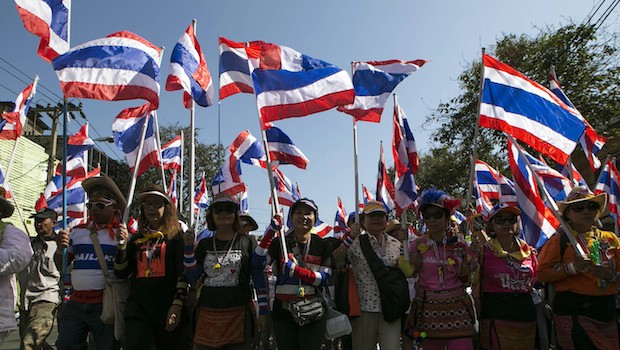
Thai anti-government protesters march with country’s flags while heading to shut down the office of the National Economic and Social Development Board (NESDB) on Thursday, January 14, 2014, in Bangkok, Thailand. (AP Photo/Wason Wanichakorn)
Bangkok, Reuters—Protesters trying to topple Thailand’s government moved to tighten the blockade around ministries on Tuesday and a hard-line faction threatened to storm the stock exchange, while major intersections in the capital Bangkok remained blocked.
The turmoil is the latest chapter in an eight-year conflict pitting the Bangkok-based middle class and royalist establishment against the mostly poorer, rural supporters of Prime Minister Yingluck Shinawatra and her brother, Thaksin Shinawatra, a former premier ousted by the military in 2006.
Although the capital was calm and the mood among the tens of thousands of protesters remained festive, analysts said the scope for a peaceful resolution of the crisis was narrowing.
“As anti-government protesters intensify actions, the risk of violence across wide swathes of the country is growing and significant,” an International Crisis Group (ICG) report said.
Ministries and the central bank have been forced to operate from back-up offices after protesters led by Suthep Thaugsuban stopped civil servants getting to work.
“In the next two or three days we must close every government office,” Suthep told a large crowd of supporters.
“If we cannot, we will detain the prime minister and other ministers. We will start by cutting water and electricity and their homes. I suggest they evacuate their children.”
Groups of demonstrators marched peacefully from their seven big protest camps to ministries, the customs office, the planning agency and other state bodies on Tuesday, aiming to paralyze the workings of government.
A student group allied to Suthep’s People’s Democratic Reform Committee (PDRC) has threatened to attack the stock exchange, with faction leader Nitithorn Lamlua telling supporters on Monday it represented “a wicked capitalist system that provided the path for Thaksin to become a billionaire”.
A PDRC spokesman said the bourse was not one its targets.
“We will not lay siege to places that provide services for the general public, including airports, the stock exchange and trains. However, we will block government offices to stop them from functioning,” Akanat Promphan told supporters at a rally.
Jarumporn Chotikasathien, president of the Stock Exchange of Thailand, told Reuters that emergency measures had been prepared to secure the premises and trading systems. Trading was normal during the morning, with the index slightly down at the midday break.
There was no special security visible at the exchange. A Reuters photographer said one group of protesters marched past on their way to the customs department but did not stop.
Deeply polarized
Disruption to government services would compound the problems faced by Yingluck, who dissolved parliament in December and called a snap election for February. Now working from Defense Ministry facilities on the outskirts of Bangkok, she heads a caretaker administration that has a limited remit and cannot initiate policies that commit the next government.
Yingluck invited protest leaders and political parties to a meeting on Wednesday to discuss an Election Commission proposal to postpone the election until May.
However, Suthep has repeatedly said he is not interested in any election. He wants the government to be replaced by an unelected “people’s council” that will change the electoral system as part of reforms that will weaken Thaksin’s sway.
“A deal to postpone the election could buy time for negotiation but would be only a stopgap without a comprehensive, broadly accepted agreement on the future political order,” the ICG said. “Thailand is deeply polarized and the prospects for such an agreement are dim.”
It is widely thought that, if the agitation grinds on, the judiciary or the military may be provoked to step in. The military has staged or attempted 18 coups in 81 years of on-off democracy, although it has tried to stay neutral this time and army chief Prayuth Chan-ocha has publicly refused to take sides.
In 2010, the army put down a pro-Thaksin movement that closed down parts of central Bangkok for weeks. More than 90 people, mostly Thaksin supporters, died during those events.
Thaksin turned to politics after making a fortune in telecommunications. He redrew Thailand’s political map by courting rural voters and won elections in 2001 and 2005.
He now lives in exile to avoid a jail sentence handed down in 2008 for abuse of power, but he is seen as the power behind Yingluck’s government. Their Puea Thai Party seems likely to win any election held under present arrangements.
Seven big intersections were occupied by the protesters and other roads were blocked off, but no big snarl-ups were reported on roads that were open.
Many schools have been closed from Monday to Wednesday as a precaution in case of trouble, but shops and most private offices were open, even if many shoppers and commuters appeared to be avoiding the city centre for now.
Siam Paragon, a huge upmarket shopping mall near the protesters’ main camp, was doing little business.
The government has deployed 10,000 police to maintain law and order, along with 8,000 soldiers at government offices, but they are keeping out of sight.
Ministers have said they want to avoid confrontation, hoping the protest will run out of steam. It flared up in early November when the government tried to force through a political amnesty that would have allowed Thaksin to return a free man.
